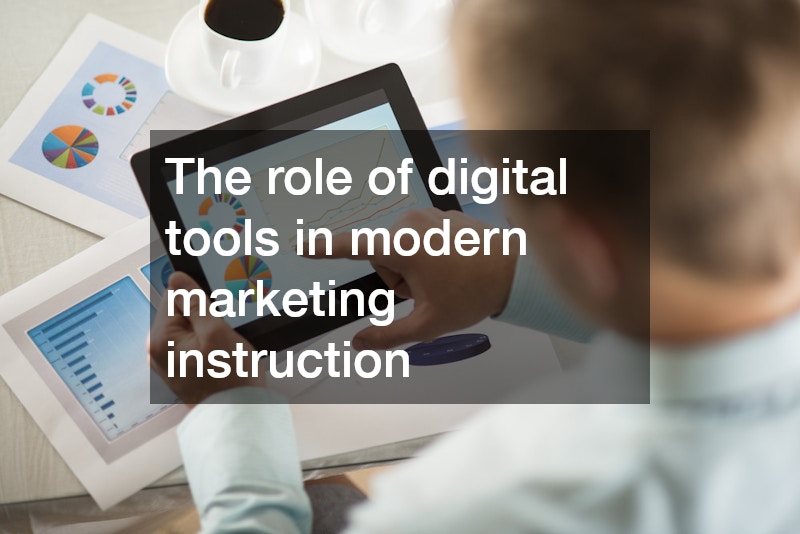In recent years, business marketing education has undergone significant changes as academic institutions and professionals in the industry have sought innovative approaches to prepare future marketers. Education programs must adapt quickly to the dynamic marketing world driven by technology advancements, changing consumer behavior, and global trends.
The traditional methods of teaching marketing may not be enough to address the complexity of today’s market. In order to make sure that students can not only grasp theoretical concepts but also apply them in real-world contexts, educational models increasingly incorporate new tools and techniques. Business marketing education has become more practical, responsive, and relevant to modern business demands, whether through digital technology, experiential learning, strategic partnerships, or partnerships with industry leaders.
Explore New Trends in Business Marketing Education
Business marketing education is always evolving. New trends are changing the way future marketers are educated. The increased use of digital technology in classrooms and online learning environments is one of the biggest changes. Teachers are exploring the ways in which tools such as social media platforms and virtual simulations can help students better understand and apply marketing concepts. These innovations enable students to interact with modern marketing challenges in a more interactive and experiential way, which helps them keep up with trends. These tools are essential to ensuring that students are prepared for careers in marketing.
On a specific level, industries such as the septic service sector can benefit from new marketing strategies developed using innovative educational approaches. Marketing students, for example, could analyze consumer behavior by using real-life case study scenarios involving septic cleaner businesses and create campaigns that promote sustainability. Students can apply marketing theory to real-life case studies, such as septic cleaning businesses, in order to better understand niche markets and develop creative marketing strategies.
The role of digital tools in modern marketing instruction

Digital tools have revolutionized the modern marketing curriculum, giving educators new ways to engage and prepare students for the future. Today’s marketing classes include tools like data analytics software and content creation platforms. Online advertising technologies also play a major role in the curriculum. These tools enable students to perform real-world tasks such as campaign management, segmentation of customers, and performance monitoring within a digital context. These tools are at the core of business marketing education, providing students with invaluable experience in navigating the complexity of digital marketing. This includes everything from content strategy development to social media management.
It is important to incorporate these tools into marketing education for businesses in sectors such as the lead paint renovation industry, where public awareness and safety regulations are often key. Students of marketing can learn how to reach audiences who are concerned about home safety, lead removal, and healthy renovations by exposing them to digital platforms. Digital tools are essential to prepare students for these specialized campaigns, which require both creative and technical marketing skills.
Simulating Strategic Marketing is a great way to develop your skills
Simulations are a great way to enhance business marketing education. Students can practice making decisions in real-world scenarios in simulated environments without having to take the risks of actual business operations. These simulations range from creating marketing campaigns for fictional businesses to managing marketing budgets within competitive market environments. These exercises help students develop crucial marketing skills, such as resource management, critical thinking, and market analysis. This hands-on approach is essential to business marketing education, as it allows students to see the results of their choices and adapt strategies in a controlled environment.
Simulations can be tailored for specific industries, such as the elevator repair companies sector, to explore niche challenges in marketing. Students could, for example, create campaigns that target building managers or facility management professionals who are key decision-makers in the market. These simulations can provide valuable insight into the marketing of service-oriented companies. Students can test strategies for elevator repair businesses that focus on reliability, safety, and long-term contracts by using simulation exercises.
Incorporating real-world case studies into marketing curricula
Case studies from real-life situations are essential for business marketing education. They allow students to learn and analyze actual business situations. These case studies are often based on companies in different industries. Students can evaluate marketing strategies and identify challenges. They can also propose innovative solutions. Students gain a better understanding of marketing landscapes by analyzing real-life cases. Students who receive a business marketing education that incorporates real-world cases will have the analytical tools necessary to evaluate market trends, consumer behavior, and the effectiveness of different marketing tactics.
A case study on a masonry business, for example, could examine how the company markets its specialized service to commercial and residential customers. Students can analyze a company’s efforts to increase its client base by examining the effectiveness and efficiency of local advertising, digital marketing, and client relation management.
Social Media Marketing: A New Approach to Education
Social media platforms are essential in today’s business world for connecting with customers. They have become an integral part of marketing education. Students can experiment with various engagement strategies, advertising techniques, and content formats using social media. Students can develop their brand voice and learn to create content that is relevant to different demographic groups using platforms like Facebook, Instagram, and LinkedIn. Social media is a powerful tool for building and maintaining strong brands. Business marketing education should emphasize this, as well as teach students about the complexity of social media metrics.
Social media can offer unique marketing opportunities for industries such as the painting contractor industry. These opportunities can be used to attract new clients. Students who are studying social media can learn how painting contractors utilize platforms that feature visuals like Instagram to show off before and after projects, testimonials from clients, and live demonstrations of the work they do. Students can learn how to create social media content that is tailored for the platform. They will be able to explore how companies use organic and paid strategies to build trust, attract leads, and ultimately grow their business.
The impact of data analytics on marketing training

Data analytics is now a vital part of marketing strategies. Its inclusion in marketing education for business students will help them make data-driven, informed decisions. Students can use data analytics to analyze consumer behavior, track campaign results, and optimize marketing campaigns based on real-time insights. This shifts marketing away from intuition-based decisions to data-backed ones, giving students the skills to interpret trends and predict market needs. Analytics is becoming a more important part of business marketing education since it can improve the efficiency and effectiveness of marketing strategies in various industries.
Data analytics can be a valuable tool for niche industries such as track surfacing companies. It provides insight into the needs and preferences of customers. In this context, students studying marketing could learn how to track data relating to sports facilities and school districts to identify potential customers. Marketers can develop targeted campaigns by analyzing trends in community investments and public works projects.
Encouragement of Creativity and Innovation through Marketing Programs
Business marketing education should cultivate creativity and innovation in students. Students who take marketing courses that emphasize creative problem-solving are encouraged to develop original, fresh ideas and think outside of the box. The creativity of students can be expressed in many ways, including through innovative advertising campaigns and interactive consumer experiences. Students need to be given the opportunity to explore new ideas, challenge conventional approaches, and create unique marketing solutions to stand out in competitive markets.
Creativity can change the game in industries such as plumbing services, where service is often seen as necessary but not exciting. Students who are learning how to market plumbing services can explore creative campaigns that highlight reliability, expertise, and customer service as the things that make one business stand out from another. Innovative marketing, whether through social media content or quirky advertising that empowers consumers, can change the way they perceive plumbing services.
Online platforms and their influence on marketing learning
Online platforms have revolutionized the way that students learn marketing. They provide them with an abundance of resources and tools. These platforms provide students with a variety of ways to learn about marketing, including webinars, interactive simulations, and podcasts. These online tools have been adopted by business marketing education, allowing students access to learning materials and the opportunity to practice marketing tasks like SEO, email marketing, and social media management. Online platforms are now a key part of marketing education. They offer a practical and immersive learning experience that mirrors today’s marketing landscape.
Online platforms can be powerful marketing tools for industries such as the general home construction business. Students of marketing can learn how contractors use platforms like Google My Business and Houzz to showcase their work and attract new clients. Students gain insight into the importance of maintaining a strong online footprint by studying how home contractors manage their online presence.
Critical thinking in business marketing students
In business marketing education, critical thinking is an essential skill. It allows students to make informed decisions and solve problems. In marketing, critical thought involves analyzing consumer behavior, assessing trends in the market, and determining what strategies are most effective for achieving business objectives. Students are encouraged to challenge their assumptions and come up with innovative solutions through business marketing education. This mindset is a key component of educational programs that prepare future marketers to navigate the complex business landscape.
Critical thinking can be used to identify the needs of commercial and residential clients for a local tree care company. Students can learn how to market a business that does not require aggressive advertising. Instead, they should educate consumers on the benefits of professional care for trees. Marketing students can develop targeted campaigns by analyzing local demographics and seasonal demand. They also consider environmental factors. These campaigns will resonate with homeowners and property managers and emphasize the safety, aesthetics, and long-term health of trees.
Collaboration between Industry and Academia to Enhance Marketing Excellence
Collaboration between academic institutions and industry professionals is crucial to the advancement of business marketing education. Universities can enhance students’ learning by fostering partnerships between businesses and academic institutions. These collaborations can take the form of internships, guest lecturers, or live projects, where students collaborate with industry professionals to develop strategies for real clients. These initiatives help students bridge the gap between theory and practical application of marketing concepts in business. This hands-on approach to marketing is a great way to ensure that students are ready for the workplace and have industry-specific knowledge.
Students working on a promotion item company’s project might be asked to develop campaigns that increase brand visibility at corporate events, trade shows or conferences. Students can learn about the importance of brand recognition, audience segmentation and product differentiation by collaborating with promotional item companies. These experiences enhance their marketing knowledge and provide them with valuable insights into the challenges that businesses face.
Putting Knowledge Into Practice
Academic programs must keep up with the latest industry trends and adopt innovative teaching techniques. Marketing education should provide students with skills to succeed in a fast-paced, competitive environment. This includes using digital tools, fostering creativity, and encouraging critical thinking. Students gain valuable practical experience by integrating data analytics, simulations, and real-world cases into the curriculum. This bridges the gap that exists between theoretic knowledge and its application in the real world. Collaboration with industry professionals enriches learning and ensures that students are ready to face the challenges of marketing in the modern world.
